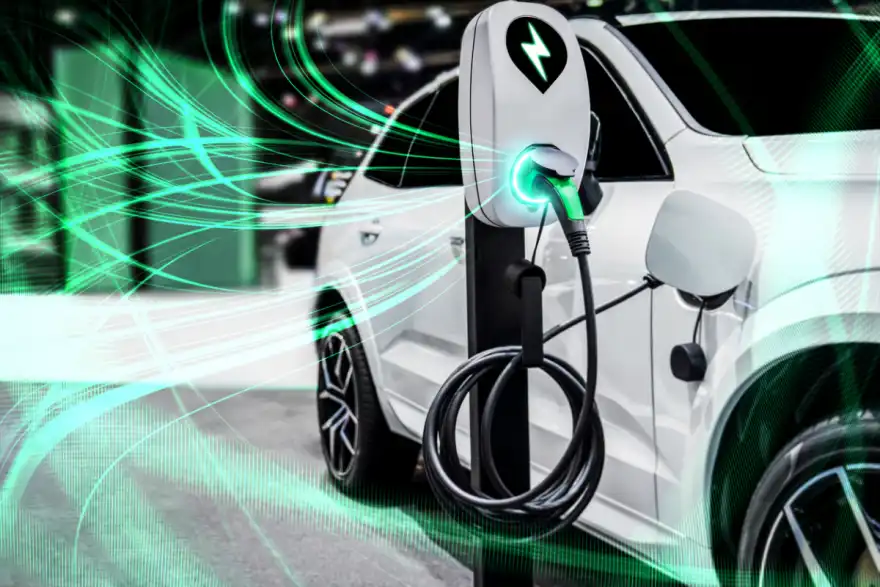
In March 2024, the UK saw a record number of new electric cars hitting the roads, with over 48,000 sporting the new '24' plate. However, despite this surge, electric vehicles (EVs) actually lost some ground in the market share. The continuous stream of negative propaganda against EVs seems to be holding back some potential buyers from making the switch to zero-emission vehicles.
But are these concerns based on facts? Let's debunk some of the top 10 myths about EVs:
1. Are EVs really clean?
While it's true that manufacturing an EV initially leaves a carbon footprint, this is steadily improving with the use of more sustainable energy sources in production and car manufacturers are finding ways to minimise the use of rare earths in batteries and motors.
It typically takes about a year and up to 17,000 miles for an EV to offset its carbon debt, depending on factors like the charging grid and driving habits. After this initial period, EVs become highly beneficial to the environment as they produce zero emissions during operation.
2. Cobalt mining is unethical
There are issues with cobalt mining, including issues like child labour in the Democratic Republic of Congo and human rights violations in unregulated Chinese mines.
However, major manufacturers are taking steps to address these concerns through initiatives like the Fair Cobalt Alliance, which focuses on getting children into schools rather than mines.
Additionally, the amount of cobalt used in batteries has significantly decreased by 90% since 2011.
3. EV batteries aren’t recyclable
Car manufacturers like Volkswagen Group have opened up their battery recycling facilities to the media, showcasing their efforts towards sustainability. Additionally, some older Nissan Leaf batteries are finding new life by powering venues like the Amsterdam Arena.
A budding battery recycling industry is also on the rise, with companies like Ecobat from the US setting up operations in the UK to transition from lead battery recycling to lithium cells.
4. Do batteries blow up?
In October 2023, there was a fire at Luton Airport car park, and some on social media quickly blamed an EV. However, the fire brigade confirmed it was actually sparked by a diesel vehicle. This incident underscores the importance of recognising that traditional combustion engines also pose fire risks due to their highly flammable fuel.
Contrary to social media rumours, EVs are actually less likely to catch fire compared to combustion engine vehicles. Motoring journalist Quentin Willson, even asserts that EVs are 19 times less likely to catch fire.
However, it's worth noting that when EVs do catch fire, the intensity can be significant. Fire brigades are now seeking guidelines and best practices regarding battery fires from each manufacturer. BYD claims its LFP cell chemistry can withstand even having a nail driven through it, showcasing advancements in battery safety.
5. EVs eat through tyres and brakes
The real-world data from fleets operated by Tusker and Lex indicates that both combustion and electric cars wear out tyres at a similar rate.
Researcher Euan McTurk, who studied this for an RAC report, brushed off claims that EVs are tougher on tyres as "certifiable nonsense….[unless] you always drive like you stole it!" Plus, because EVs use electric motors for regenerative braking, there's less strain on the friction brakes, potentially extending their lifespan.
6. Can the UK’s National Grid cope?
"Anyone who says the grid won’t be able to cope with the energy transition is expecting us not to build anything again," explains Lorna McAtear, who heads the National Grid's fleet. "We’ll put in more onshore wind in the next seven years than the last 30 years, and connection requests are predicted to climb from 165 to 2000 per day.’"
The introduction of energy-efficient LED bulbs has given the grid some breathing room. Plus, in the near future, bi-directional charging, where electric cars and other storage solutions feed energy back into the grid when needed, will further bolster our energy infrastructure.
However, it's no secret that the grid is feeling the strain of increased demand for new connections. Efforts are underway to address bottlenecks and reorganise to accommodate the growing number of chargers and other energy needs.
7. Can you charge on the road?
According to Zap-Map's recent findings for the first quarter of 2024, the UK has now installed 59,590 chargers, with an impressive 5,725 added in that quarter alone. This marks a 35% increase compared to the installations in the same period of 2023.
Currently, only about 15% of existing chargers are utilised. Critics of electric vehicles often overlook the fact that charging at home, especially if you have a driveway, is usually convenient. Yet, long-distance charging remains a concern. How often will you really find yourself driving hundreds of miles in an EV? It's a question worth considering.
8. Will EVs crush car parks?
EVs are not significantly heavier than traditional cars, so concerns about them damaging infrastructure are unfounded.
The ten heaviest cars in the UK are all traditional combustion engine models, and even the Tesla Model X, which comes in at 2.5 tonnes, only ranks eleventh. In comparison, the Model 3 weighs around 1.8 tonnes, which is similar to high-end German cars.
9. Winter hammers EV range
It is true that electric vehicles experience about a 20% decrease in battery efficiency during cold weather. However, interestingly, the American Department of Energy website indicates that ICE cars also lose around 15% efficiency in wintry conditions. So, in terms of performance, EVs are quite comparable to petrol cars, though this aspect is often overlooked."
10. EVs are unaffordable
Even though the initial prices of new EVs are dropping, we're not quite at the point of price parity with traditional combustion cars. There's still an average difference of £10k, making EVs seem too expensive for some.
Read Regit's list of the top 10 cheapest EVs of 2024 here.
However, while upfront costs may still be higher for EVs, the total cost of ownership over the vehicle's lifespan is often lower due to reduced maintenance and fuel expenses. It's the acquisition cost that's causing hesitation, but the long-term savings are substantial.
Misinformation about EVs persists, fuelled by sensationalised stories in the media. However, balanced reporting and factual information can help dispel these myths and encourage more people to consider the benefits of electric vehicles.




